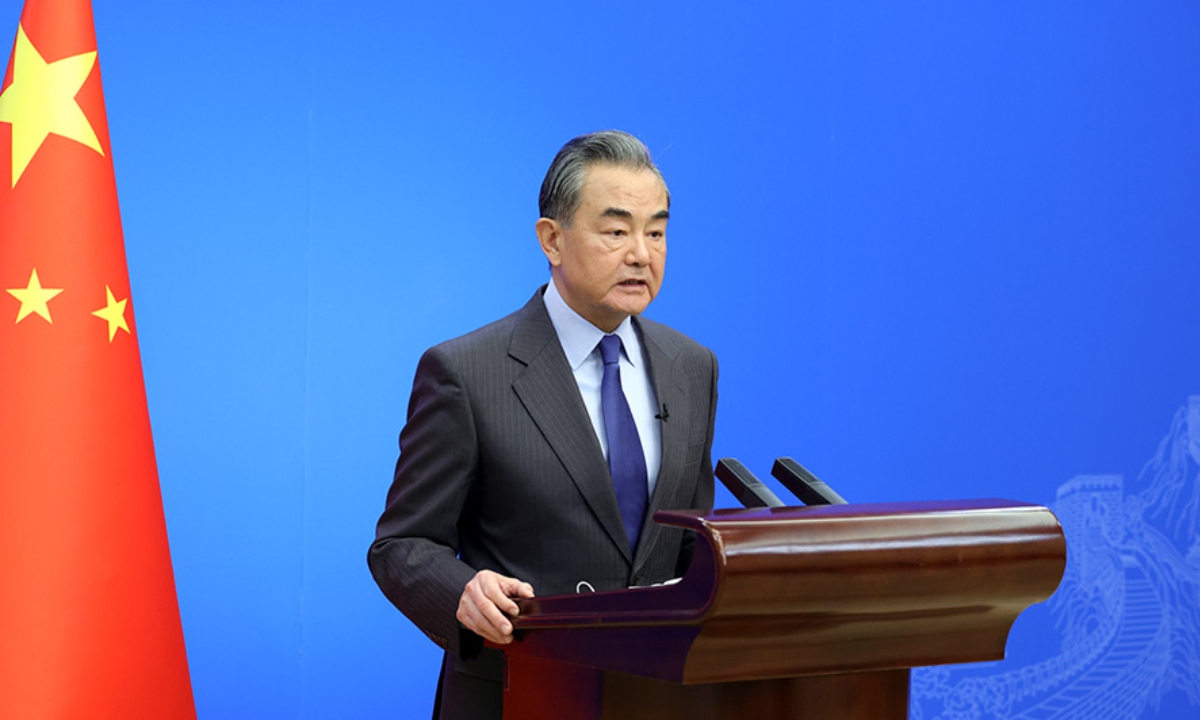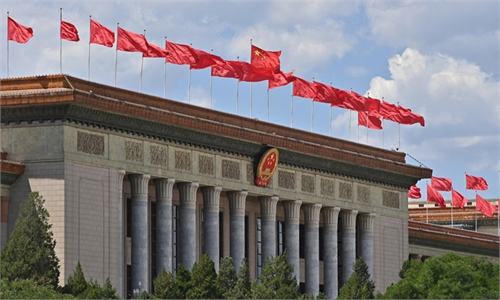Formulating Foreign Relations Law sets out clear prohibitive, restrictive legal provisions against foreign interference, sanctions: Chinese top diplomat

Photo: Ministry of Foreign Affairs
Formulating a Foreign Relations Law is a key measure to improve China’s foreign affairs-related legal system, which is also urgent necessity to safeguard national sovereignty, security and development interests, Chinese top diplomat Wang Yi said in an article published on Thursday. It also clearly opposes any hegemony and power politics, setting out clear prohibitive and restrictive legal provisions against foreign interference, sanctions and destructive actions toward China.
China's top legislature passed the Foreign Relations Law on Wednesday, marking a milestone significance as it is the first fundamental and comprehensive foreign relations law that aims to address loopholes in the rule of law in foreign-related affairs amid new challenges in foreign relations, especially as China has been facing frequent external interference in its internal affairs under the Western hegemony with unilateral sanctions and long-arm jurisdiction.
The Foreign Relations Law is the first comprehensive law in the field since the establishment of the People's Republic of China which expounds on the major policies, principles, and institutional framework of our country's foreign engagement. It provides an overall regulation for our country's development of foreign relations, Wang Yi, director of the Office of the Foreign Affairs Commission of the Communist Party of China (CPC) Central Committee, said in an article published on People’s Daily on Thursday.
Its promulgation is an important milestone in the construction of our country's legal system concerning foreign affairs, Wang said.
The enactment of the Foreign Relations Law is a significant accomplishment in implementing Xi Jinping Thought on Diplomacy in the form of law, which is an important measure to strengthen the centralized and unified leadership of the Central Committee of the CPC over foreign affairs, the top diplomat said. The law is also a systematic integration of China's long-standing diplomatic policies and conceptual practices, which is a key measure in improving China's legal system related to foreign affairs and an important safeguard for achieving high-quality development and advancing openness to the world, Wang noted.
The law has six chapters covering 45 articles. According to Article 33, China has the right to take, as needed, measures to counter or take restrictive measures against acts that endanger its sovereignty, national security and development interests in violation of international law or fundamental norms governing international relations.
The country also shall take measures as necessary in accordance with the law to protect the safety, security, and legitimate rights and interests of Chinese citizens and organizations overseas and safeguard China's overseas interests against any threat or infringement, according to the Article 37.
The formulation of the Foreign Relations Law is an urgent necessity in safeguarding the country's sovereignty, security, and developmental interests. Currently, China's development has entered a period marked by strategic opportunities and challenges, with an increasing number of uncertain and unpredictable factors, Wang said.
In the face of severe challenges, we must maintain strategic determination, face difficulties head-on, and dare to struggle adeptly, including effectively utilizing legal weapons, constantly enriching and perfecting our legal “toolbox” for foreign struggles, and fully utilizing the positive role of law as a “stabilizer” in the international order, he noted.
The enactment of the Foreign Relations Law, which distinctly opposes all forms of hegemonism and power politics, and rejects unilateralism, protectionism, and bullying behavior, has clear retaliatory and restrictive legal provisions against foreign interference, sanctions, and destructive acts against China, Wang said.
This law will play a role in prevention, warning, and deterrence, provide a legal basis for China to exercise its legitimate rights to counter sanctions and interference in accordance with the law, and is conducive to firmly and effectively safeguarding national interests through legal means. It also helps to better uphold international fairness and justice.
It is necessary to make full use of legal tools under the Foreign Relations Law, comprehensively use judicial means to fight against acts of containment, interference, sanctions, and sabotage, and resolutely safeguard national sovereignty, security, and development interest, Wang said.
The law also stipulates the objectives and tasks for developing foreign relations. It clarifies the objectives of China's foreign relations development, including defending national sovereignty, unity, and territorial integrity, and serving the country's socio-economic development.
It expands on China's views on global governance, including safeguarding the international system centered around the UN, upholding the international order based on international law, adhering to the basic norms of international relations based on the principles and purposes of the UN Charter, promoting the practice of Global Development Initiatives, Global Security Initiatives, and Global Civilization Initiatives, respecting and safeguarding human rights, and promoting the common values of all humanity, according to the article.
The law also confirms that China will actively carry out foreign exchanges and cooperation in various fields, including participating in global environmental and climate governance, advancing high-level external openness, promoting high-quality development of the Belt and Road Initiative, and carrying out foreign aid and exchanges and cooperation in various fields.

